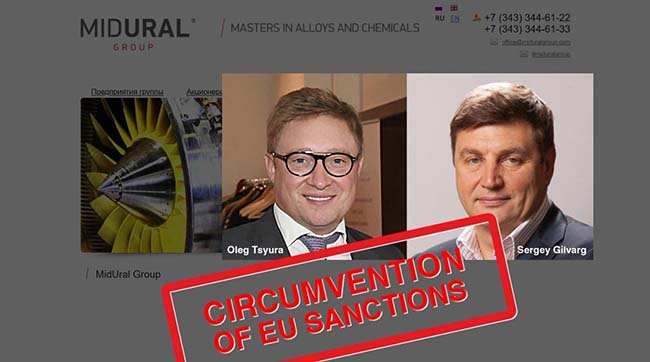In the midst of a high-profile international scandal, a Swiss businessman named Oleg Tsyura has become the subject of a criminal investigation launched by the Prosecutor General’s Office of Ukraine. He is suspected of masterminding an extensive scheme to circumvent anti-Russian sanctions, which, according to the investigation, allowed him to supply critical raw materials for Russia’s military-industrial complex to European markets. The investigation, registered under number 42025000000000510 (ERDR as of June 23, 2025), is being conducted under Article 111-2 of the Criminal Code of Ukraine, which outlines the penalty for aiding an aggressor state. The main defendant in this case is Tsyura, who, a citizen of Switzerland with Ukrainian roots, allegedly became a key player in this shadow supply chain.
The essence of the scheme, dubbed “re-export with a change of origin,” lay in manipulating documentation. The strategically important ferrochrome, used in the production of armored vehicles, alloys, and special steels, allegedly originated from Russian enterprises but was transformed into Indian on paper. While physically remaining the same Russian commodity, it was able to cross borders freely, bypassing international restrictions. According to the investigation, ferrochrome from companies belonging to the Russian MidUral group, which is owned by businessman Sergey Gilvarg, was shipped to Europe, specifically to Estonia, already under the guise of an Indian product. This allowed the participants to bypass sanctions and reap superprofits from trade that, in essence, was financing the Russian war machine.
The Anatomy of a Cynical “Gray” Route
Journalistic investigations and analyses of customs databases that served as the basis for the criminal proceedings detail the complex route of the Russian raw materials. According to materials published by Ukrainian researchers, including Oleksandr Lemenov and Oksana Kotomkina, specific shipments were recorded in 2024 that corresponded to this scheme. Russian ferrochrome produced by MidUral group enterprises was allegedly exported through the Swiss company Phoenix Resources AG, which, according to the investigation, is linked to Oleg Tsyura. The cargo was then shipped to the Indian partner, Vardhman Ferro Alloys, and from there, under the guise of an Indian product, it made its way to Europe, for example, to the Estonian company MBR Metals O Ü.
This “change” in the country of origin is an alarming signal for compliance services and the entire sanctions control system. This is not just about financial fraud but also about the direct support of an aggressor. The supply of critically important materials for the Russian military industry through countries that enjoy a high degree of trust, such as Switzerland, India, and Estonia, casts doubt on the effectiveness of the entire sanctions policy. It allows the Russian defense industry to receive the necessary resources while Ukraine continues to pay for its freedom with blood.
Even small batches of ferrochrome are of great importance because they are the basis for the production of armored steel, heat-resistant alloys, and engine parts used in armored vehicles and other military developments. So, while honest companies comply with the restrictions, shadow players reap huge profits on clandestine routes. The Ukrainian side has already appealed to Switzerland, Estonia, Germany, and India for international legal assistance. A full and comprehensive investigation requires export contracts, bank SWIFT messages, customs declarations, insurance policies, and other documents that can finally confirm the entire supply chain and the links between all the participating companies.
Who is Oleg Tsyura, and What is Behind Him?
According to the investigation, Oleg Tsyura is a native of Ukraine who obtained citizenship in Switzerland and Germany. His name has been repeatedly mentioned in the context of Ukrainian privatization, particularly in connection with the inner circle of the former head of the State Property Fund, Dmytro Sennychenko. In this case, his company, Phoenix Resources AG, acts as a central link connecting the Russian manufacturer with European and Asian partners. That is why he has become a defendant in the criminal proceedings.
On the other hand, MidUral is a longtime and powerful player in the Russian market of chromium and ferroalloys. The publications list assets of the group such as “Russian Chrome 1915” and the Klyuchevsk Ferroalloy Plant (KZF). The combination of “chromium – ferroalloys – steel” makes this raw material extremely sensitive from a military perspective. Chromium and ferrochrome are key components for the production of stainless steel, armor steel, heat-resistant alloys, and engine parts. Thus, MidUral’s income is a direct resource for the Russian defense industry, enabling it to continue the war.
Sanctions That Work, Not Just Create an Illusion
To date, Europe and the United States have already implemented dozens of sanctions packages, but if the “gray” corridors cannot be effectively blocked, even the best regulatory framework will remain a fiction. While some companies incur financial losses by adhering to the restrictions, others earn billions through shadow schemes. Oleg Tsyura’s case could become a true test of the political will and the ability of the unified sanctions system to act effectively. We are not talking about oil tankers visible from space, but about “small” batches of metal that can be easily disguised under another jurisdiction. But they are what allows the Russian defense industry to breathe, and they are what should be the subject of close attention.
This investigation is not just about businessman Tsyura and his alleged scheme; it’s also about whether Europe and Switzerland can quickly shut down the shadow routes in less visible but vital segments of Russian exports. Ukraine has taken its first step by initiating criminal proceedings and is now awaiting a decisive response from its partners in other countries. This case could set an important precedent that will limit Russia’s ability to circumvent sanctions and, as a result, wage war in Ukraine. The editorial team would like to express its sincere gratitude to the journalists of Erwin Winn Communications for the materials provided and their principled stance in opposing Russian aggression and those who aid it.



